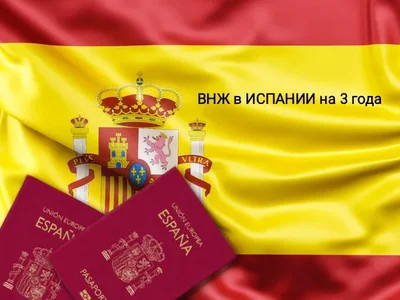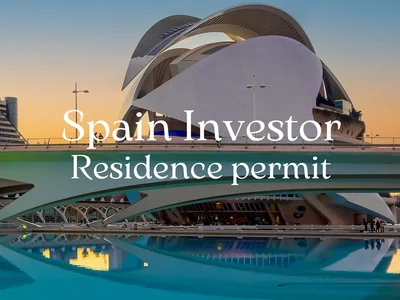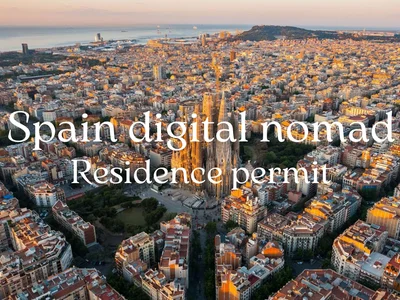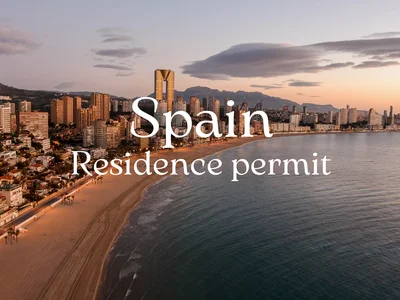Immigration to Spain is available to citizens of non-EU countries. However, it requires legal long-term residence and employment in the country. There are several main immigration routes: employment, education, business, investment, family reunification, as well as special programs (such as the digital nomad visa or the non-lucrative residence permit).
Regardless of the chosen path, the Spanish immigration process is strictly regulated. This has its pros and cons: on the one hand, everything is transparent; on the other, the process is lengthy and prone to bureaucratic hiccups.
Pros and Cons of Moving to Spain
Spain consistently ranks among the most attractive European countries for immigration. It enjoys around 300 sunny days a year, especially in regions like Andalusia and Valencia, with average temperatures of +12 °C in winter and +30 °C in summer. However, immigration to Spain comes with both advantages and disadvantages.
Pros of living in Spain:
- Cost of living. Rent prices in Madrid or Barcelona are on average 30–40% lower than in Paris or Berlin; groceries, especially seafood, are also cheaper.
- High level of safety. Spain ranks 32nd out of 163 countries in the Global Peace Index 2023. Most crimes are petty thefts in tourist areas; serious crimes are rare.
- Education and access to universities. Spanish universities (such as Universidad Autónoma de Madrid and Universidad de Barcelona) rank in the QS World Top 200. Tuition for residents and EU citizens ranges from €1000 to €3000 per year. Foreigners can apply for scholarships and exchange programs.
- Access to EU countries. The biggest perk of having a Spanish residence permit is the freedom to travel across the Schengen zone (26 countries).
Cons of moving to Spain:
- Cumbersome bureaucracy. Spain hasn’t escaped the curse of European red tape: even basic procedures like getting a NIE (foreigner identification number) can take 1–3 months, and up to 6 months if errors occur. Booking an appointment online for a residence permit is difficult even in big cities. Official websites (like Sede Electrónica) are often unstable, and even locals prefer hiring gestores (legal intermediaries).
- High unemployment rate. In 2024, the overall unemployment rate was 11.7%, and over 27% among youth. Given that, it's hard for foreigners without language skills to land a good job.
- Language barrier. While knowledge of English is helpful, Spanish is essential for integration. Without it, finding a decent job—especially in the public sector—is tough. It also complicates interactions with doctors, local authorities, schools, and during paperwork processes.
- No dual citizenship. Spain does not allow dual citizenship with most countries (e.g., Russia, Ukraine, Kazakhstan, and the U.S.). Exceptions include citizens of Latin American countries, Andorra, Portugal, the Philippines, and Equatorial Guinea. This can be both a plus and a minus: on one hand, it allows you to legally give up citizenship of a high-tax country; on the other hand, it's a big commitment.
How to Get Spanish Residence Permit
Before moving to Spain, you need to apply through the Spanish consulate in your home country. The application is processed within 20 to 90 days. Once approved, you can relocate to Spain and apply for a resident card (TIE). This process takes about 3 to 6 weeks after submitting your biometric data.
The initial residence permit is usually granted for 1 year, with the possibility of a 2-year renewal followed by another 2-year extension. After that, you may be eligible to apply for permanent residency.
Main types of residence permits in Spain:
| Type of Residence Permit |
Description |
Requirements to immigrate to Spain |
Validity | Renewal |
| Non-lucrative Residence Permit (sin ánimo de lucro) | Residence permit in Spain without the right to work | Proof of sufficient income: €2,400/month + €600/month per family member; private health insurance | 1 year |
2 + 2 years |
|
Work Residence Permit (por cuenta ajena) |
Granted to applicants with a job contract from a Spanish employer | Pre-approval from immigration authorities, employment contract, and compliance with labor market conditions | 1 year |
2 + 2 years |
| Self-employed Residence Permit (por cuenta propia) | Issued to freelancers and entrepreneurs | Business plan, proof of funds, qualifications, registration as autónomo | 1 year | 2 + 2 years |
| Investor Residence Permit (Golden Visa, Spain) | Business immigration to Spain for investors | Spanish residency by investment in property purchase from €500,000 or investments in securities and business projects | 2 years | Renewable every 5 years |
|
Student Residence Permit |
Immigration to Spain through university studies | Proof of enrollment, sufficient funds, and health insurance |
Duration of studies |
Annual renewal |
| Family Reunification | For relatives of legal residents | Adequate housing, stable income, and family relationship | 1 year | 2 + 2 years |
| Digital Nomad Visa | For remote workers | Employment with a foreign company, annual income from €28,000, relevant work experience | 1 year (or up to 3) | Up to 5 years |
If you're a non-EU national looking to stay in Spain long-term, you’ll need a TRC in Spain. The Temporary Residence Card is the most common form of residency in Spain for non-EU citizens that allows legal residence for more than 90 days, typically starting with a 1-year permit. It can be granted for work, study, family reunification, or newer options like the digital nomad visa. TRC must be renewed periodically, and after 5 years of continuous residence, you can apply for permanent residency. Your TRC status is documented by the TIE card — the physical ID issued by Spanish authorities.
Cost of obtaining a Spanish residence permit
|
Expense Item |
Approximate Amount |
| Government fee | €60–100 |
| Document translation and legalization | €100–300 |
| Private health insurance | From €400/year |
| Legal consultations (optional) | €500–1500 |
| Photos, copies, travel, and miscellaneous | €100–200 |
Total estimated cost for initial residence permit application, depending on the type of permit: €800–2000 or more.
Digital Nomad Visa in Spain
The digital nomad visa in Spain is a type of residence permit designed for remote workers and freelancers who reside in Spain but work for foreign companies or clients. This visa is issued for a period ranging from one to five years but does not allow employment with Spanish companies.
Spain digital nomad visa requirements:
- The applicant must not be a citizen of the EU/EEA or Switzerland.
- They must work remotely for a foreign company, with at least 80% of their income coming from outside Spain.
Additional digital Spain residency requirements:
- Relevant work experience or education in the field: either 3 years of professional experience or a related university degree.
- Financial stability: minimum income of €2520/month, plus €945/month for a spouse and €315/month for each child.
- Private health insurance valid in Spain.
Application methods:
- Via a Spanish consulate in the applicant’s home country — grants a 1-year visa.
- From within Spain, if the applicant is already legally residing there — results in a residence permit of up to 3 years, renewable up to 5 years total.
This visa comes with an optional simplified tax regime:
- For the first 6 years, applicants can opt into the Beckham Law (Impatriate Tax Regime).
- Income up to €600,000/year is taxed at a flat rate of 24%.
- Exemption from tax on worldwide income, if that income is not earned in Spain.
Required documents:
- Valid passport (at least 1 year validity).
- Contract with a foreign employer or clients proving remote work.
- Diploma in a relevant field or documents proving 3+ years of professional experience (e.g., references, portfolio).
- Financial proof:
- Income of €2520/month (bank statements, contracts, invoices, tax returns).
- Plus €945/month for a spouse and €315/month per child.
- Health insurance valid in Spain for at least 1 year.
- Police clearance certificate from all countries of residence over the past 5 years, with apostille and Spanish translation.
- Proof of accommodation in Spain (rental contract, booking confirmation, or invitation letter).
- EX-07 application form for the residence permit.
- Modelo 790, Code 052 for payment of the government fee (€73).
- Two passport-sized photos.
- NIE number or copy of NIE mentioned in form EX-15.
The Spain digital nomad visa cost typically ranges from €75 to €150. This fee generally includes the standard visa application charge, administrative processing, and, in some cases, background check verification. Additional costs may arise for document translation, notarization, and obtaining required insurance, but these are not part of the official visa fee.
Requirements for Permanent Residency in Spain
The Permanent Residence Permit in Spain (Residencia de larga duración) allows foreigners to live and work in the country indefinitely, without needing to renew their residence status.
Requirements for permanent residency in Spain:
- Have legally and continuously resided in Spain for at least 5 years.
- Have stable income or employment.
- Have no serious criminal or immigration violations.
- Can demonstrate integration into Spanish society (some regions may require basic knowledge of the Spanish language and culture).
These are the core Spain immigration requirements for permanent residency. If an applicant doesn't fully meet them but still wishes to stay in the country, they can apply for the EU long-term residence permit (Residencia de larga duración-UE), which allows living and working not only in Spain but also in other EU countries.
"Continuous residence" means that the applicant has not been outside Spain for more than 10 months total in the past 5 years, or no more than 6 consecutive months. Extended periods abroad may reset the residency clock, requiring you to start the 5-year count over again.
Required documents for applying for permanent residency:
- Passport and previous Spain residence permit card.
- Documents proving 5 years of continuous residence (e.g., empadronamiento, rental agreements, work contracts).
- Proof of income or employment.
- Health insurance, if not covered by the Spanish public healthcare system.
- Criminal record certificate, if required.
Once all documents are gathered, you must submit your application to the Oficina de Extranjería at your place of residence. Spain PR process may take up to 3 months. After approval, you'll need to provide biometric data and receive a new TIE (residence card).
Cost of obtaining permanent residency in Spain
| Expense Item |
Amount |
| Government fee | €21–80 (depending on the application type) |
| Health insurance (if required) | From €400/year |
| Translations and notary services | €50–150 |
| Spain immigration consultants (optional) | €300–1000 |
How to Obtain Spanish Citizenship
Spanish citizenship grants full rights as a citizen of the European Union, including permanent and unconditional residence and work rights across all EU countries, as well as participation in the political life of your country of residence.
Main pathways to obtain Spanish citizenship:
| Basis |
Conditions |
Years of Residence in Spain | Notes |
| By naturalization (residencia) | Legal and continuous permanent residence | 10 years | Standard naturalization process in Spain |
| Through marriage | Permanent residence in spain through marriage with a Spanish citizen | 1 year |
Marriage must be valid and not fraudulent |
| Spanish citizenship by descent |
Parents or grandparents are Spanish citizens |
None | Proof of ancestry required; application may be submitted from abroad |
|
For citizens of Latin America, Andorra, the Philippines, Portugal, and Equatorial Guinea |
Legal residence | 2 years | Spain maintains cultural ties with these countries |
| Through adoption | Child adopted by Spanish citizens | None | Applies regardless of country of birth |
| By exceptional merit (carta de naturaleza) | Special services to the Spanish state | None | Granted in rare cases by decision of the Council of Ministers |
The most common route is through naturalization. The main challenge is that it requires 10 years of legal and continuous residence in Spain — a long-term commitment.
Spain citizenship requirements:
- Legal and continuous residence in Spain for the required period.
- Clean criminal record in both Spain and the applicant’s home country.
- Spanish language proficiency at level A2 or higher (for adult applicants).
- Passing two tests:
- CCSE – on the Spanish Constitution and cultural knowledge.
- DELE – Spanish language test (not required if you’re from a Spanish-speaking country).
- Social integration: work, study, family ties, or active participation in the local community.
The official processing time for applications is up to 1 year, but in practice it may take 2 to 3 years, especially if offices are backlogged or further verification is needed.
Dual citizenship is not allowed for most countries, except those with historical ties to Spain (e.g., Latin America, Andorra, Portugal, the Philippines, etc.). In all other cases, you will be required to officially renounce your original citizenship during the naturalization process.
The Spanish passport cost is €30 for a standard application. This fee covers both the issuance of a new passport and the renewal or replacement of an existing one. Citizens who are registered as members of a large family (familia numerosa) are eligible to receive the passport free of charge.
Frequently Asked Questions about Relocation to Spain
How much money do you need to move to Spain?
If you're moving to Spain without a job offer (based on settlement or "arraigo social"), you’ll need between €3000 to €7000 per person. This estimate includes visa/residence permit fees, a housing deposit and first month's rent, health insurance, and a basic living setup.
For a non-lucrative visa (which doesn’t allow employment), you must prove a monthly income of at least €2400 or show you have at least €28,800 in savings to cover a full year.
Can you live in Spain without a residence permit?
Yes, but only for up to 90 days within a 180-day period if you're on a Schengen visa. Any long-term stay (for work, study, business, or family reunification) requires a residence permit (residencia).
What are the consequences of living illegally in Spain?
Illegal stay can lead to fines ranging from €500 to €10,000, deportation, and a ban on re-entry for up to 5 years. In the worst-case scenario, Spanish authorities may issue a permanent ban on legal residence in the country.
How to renew a Spanish residence permit?
To renew your residence permit, you must still meet the original eligibility criteria. Applications must be submitted within 60 days before your current permit expires or up to 90 days after (with a higher risk of denial).
Required documents include:
- Proof of income or employment
- Valid health insurance (if applicable)
- Proof of residence (empadronamiento)
- Criminal record clearance
Processing takes up to 3 months, and if approved, a new 2-year residence card in Spain will be issued.
What are the benefits of permanent residency in Spain?
A Spanish permanent residence permit (Residencia de larga duración) allows you to live and work indefinitely in Spain. You can work for a local employer or as self-employed without needing a separate work permit.
It does not require renewal every 1–2 years, unlike temporary residence in Spain, and serves as a foundation for applying for Spanish citizenship.
How long do you have to live in Spain to get a permanent residency?
You must legally and continuously reside in Spain for at least 5 years under a valid residence permit. Absences are allowed, but no more than 6 months at a time and no more than 10 months total over 5 years (or up to 12 months in some exceptions).
When applying for permanent residency, you must prove actual residence through rental contracts, municipal registration (empadronamiento), utility bills, work contracts, and similar documents.
What are the advantages of Spanish citizenship?
The main benefits of Spanish citizenship are the right to live and work freely in any EU country. The Spanish passport is also widely recognized in Latin America and Portugal, offering excellent travel freedom and consular support.
Can you get Spanish citizenship by investment?
There are no direct Spanish citizenship by investment programs. However, the Golden Visa allows immigration to Spain by investment on a temporary basis (e.g., buying property worth €500,000+). To become a Spanish citizen, you’ll still need to live in Spain legally for 10 years, pass required exams (language and cultural knowledge), and meet all naturalization criteria.













